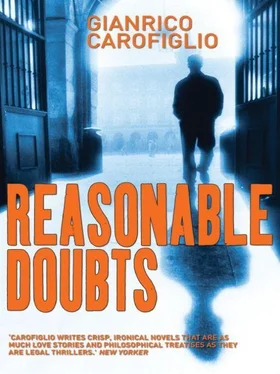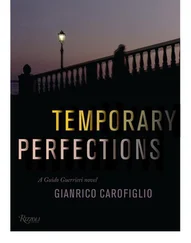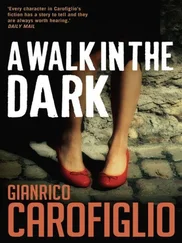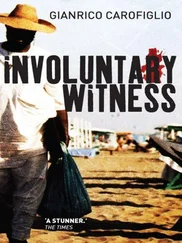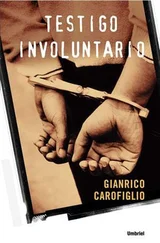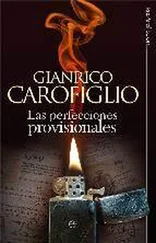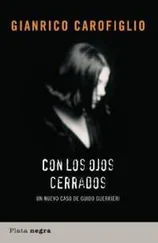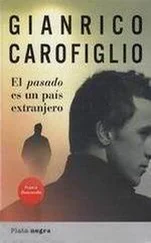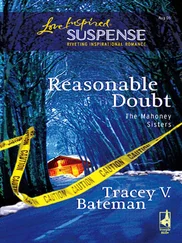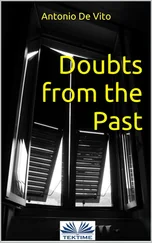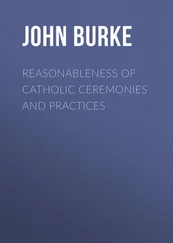Gianrico Carofiglio - Reasonable Doubts
Здесь есть возможность читать онлайн «Gianrico Carofiglio - Reasonable Doubts» весь текст электронной книги совершенно бесплатно (целиком полную версию без сокращений). В некоторых случаях можно слушать аудио, скачать через торрент в формате fb2 и присутствует краткое содержание. Жанр: Криминальный детектив, на английском языке. Описание произведения, (предисловие) а так же отзывы посетителей доступны на портале библиотеки ЛибКат.
- Название:Reasonable Doubts
- Автор:
- Жанр:
- Год:неизвестен
- ISBN:нет данных
- Рейтинг книги:5 / 5. Голосов: 1
-
Избранное:Добавить в избранное
- Отзывы:
-
Ваша оценка:
- 100
- 1
- 2
- 3
- 4
- 5
Reasonable Doubts: краткое содержание, описание и аннотация
Предлагаем к чтению аннотацию, описание, краткое содержание или предисловие (зависит от того, что написал сам автор книги «Reasonable Doubts»). Если вы не нашли необходимую информацию о книге — напишите в комментариях, мы постараемся отыскать её.
Reasonable Doubts — читать онлайн бесплатно полную книгу (весь текст) целиком
Ниже представлен текст книги, разбитый по страницам. Система сохранения места последней прочитанной страницы, позволяет с удобством читать онлайн бесплатно книгу «Reasonable Doubts», без необходимости каждый раз заново искать на чём Вы остановились. Поставьте закладку, и сможете в любой момент перейти на страницу, на которой закончили чтение.
Интервал:
Закладка:
Damn it, what was I getting myself into?
I shook my head politely. It’s no problem, really.
“We’re trying to figure out who put the drugs in your car and how. It seems very likely that it happened when the car was in the hotel car park. Do you remember the name of the porter on duty the last night?”
She didn’t remember. She was usually a bit distracted and didn’t pay much attention to people.
She would obviously be a great help in our so-called investigation.
“Apart from the porter, did you notice anything unusual during your stay or during the return journey? When you were on the ferry, did you see anyone you’d already seen during the holiday, staying at the same hotel?”
She hadn’t noticed anything. She hadn’t even noticed the man who’d stayed at their hotel and then had travelled back on the same ferry. She told me her husband, when he’d talked to her about our conversation, had already mentioned this man and had asked her if she remembered him.
But she didn’t remember him, probably because she hadn’t really seen him.
I kept going with my questions a while longer, trying to get her to remember something, anything. Even details which seemed insignificant, I said, could turn out to be very useful. This was the way an investigator had to proceed, it seemed to me. In fact I had no idea what I was doing and was basically just imitating what detectives did in crime movies.
In the end I gave up. But I told her to think about it later and, if she remembered anything, even that famous apparently insignificant detail, to call me.
As I said this, I had a sudden feeling of pointlessness. Mixed with shame. This investigation of mine was a farce. I wouldn’t find out anything. I was just trying to impress Natsu. I was unfairly deluding her and her bastard of a husband.
I told myself I should finish with this nonsense as soon as possible. I would wait to see what Colaianni told me about Macri and what Tancredi came up with on the subject of the passenger list and then, since it was highly unlikely anything would come of it, I would talk to Paolicelli and tell him that unfortunately we had no choice but to plea-bargain.
I would say that I realized how difficult it was to agree to something like that, if you think you’re innocent – if you are innocent – but unfortunately we had to be realistic. With no evidence in our favour, nothing that could be used to introduce a degree of reasonable doubt, it would be madness to give up on plea-bargaining and go ahead with an appeal. We had to limit the damage.
I stood up, and after a moment’s hesitation she stood up, too.
“You told me you’d like to try my cooking.”
“I’m sorry?”
“There’s an exhibition opening tomorrow night.” She took a small card made from rough white paper out of her handbag. “There’s a reception and I’m taking care of the buffet. Japanese food with a few variants of my own creation.”
She handed me the card.
“This is an invitation for two. You can bring your girlfriend if you like, or whoever. The reception starts at nine o’clock. I think it could be fun. It’s in a garage that’s been converted into an exhibition space.”
I thanked her and looked at the card. I had never heard of either the artist – nothing unusual about that – or the address. And that was a little more unusual, as it was in Bari.
I told her I had a previous engagement, but I’d see if I could get out of it because I’d really like to go.
Of course I didn’t have any previous engagement. I’d only said that to make myself look good. Don’t worry about me, I have a wild social life. I’m not a loser who spends his evenings in the office studying files, or in a gym taking punches, or alone at the cinema, trying not to think about his girlfriend who left him.
A stab of pain. A photographic negative of Margherita. Dissolve.
Now Natsu really had to go. She walked a little faster to the door, as if she felt embarrassed and wanted to leave in order to get rid of that embarrassment.
We shook hands, and I opened the door for her. The little girl was sitting on Maria Teresa’s lap at the computer, which was emitting strange gurgling and splashing sounds.
The girl asked when she could come back and play Bubbles and Splashes again. Maria Teresa told her she could come back whenever she liked, and the girl kissed her, jumped up and went to her mummy. On the way out, she even waved goodbye to me.
“Beautiful little girl, isn’t she?” I said when they had gone.
“Beautiful?” Maria Teresa replied. “She’s amazing.”
“Yes, she’s very beautiful,” I said, as I went back into my room, lost in thought.
I went and sat down, and stayed there for at least five minutes, without doing or saying anything.
When I came to my senses, I got out the street map to look for that address.
13
In front of the entrance stood a man who looked like a bodybuilder. He was wearing a dark suit, and had a microphone and earpiece. He asked me if I was alone. No, I’m with the invisible woman. And from the intelligent look on your face, I assume you’re Ben Grimm.
I didn’t say that, but I did go right up to him – wondering who’d emerge the winner if we got into a fight – and made a gesture with my hand, to show him that there was no one next to me, so yes, I was alone. It didn’t occur to me to say it out loud.
He let me pass, and then whispered a few words I didn’t catch into the microphone. Maybe he was warning his colleagues inside that a suspicious character was coming in and they’d better keep an eye on him. I descended a ramp and found myself in a strange place. It was a real garage, though obviously without cars. The floor was covered with porphyry building blocks, and scattered throughout the space were those mushroom-shaped heaters you find in bars so that people can be in the open air even in winter. It was fairly cold all the same, so although I unbuttoned my jacket I didn’t take it off.
There were a lot of people there. My first thought, as I entered, was that it was like some vaguely surreal film set. Groups of very well-to-do but left-wing ladies. Groups of unmistakably gay young men and women. Groups of people of different ages, dressed to display the fact that they were artists. A few politicians, a few would-be intellectuals, a few young black men, a few Japanese. No one I knew.
It was such a weird mixture that it immediately put me in a good mood. I thought I would take a quick look at the works, in order not to be unprepared, and then look for the food. And Natsu.
On a small table, close to the entrance, there were catalogues. I took one and leafed through it as I moved closer to the walls. The title of the exhibition was The Elementary Particles.
I wondered if it was a reference to the novel by that Frenchman. I hadn’t liked the book, but I assumed it was meant to be a clue to understanding the works.
From a distance, the paintings on display were reminiscent of Rothko. All things considered, they weren’t bad. I went up to one of them. I was examining it, trying to grasp the technique, when a voice behind me made me jump.
“Are you Piero’s boyfriend?” He had orange hair and looked like an Elton John clone. A local Elton John, judging by the accent.
No, friend, you’re more likely to be Piero’s boyfriend, whoever the hell this Piero is.
“No, I’m afraid you’ve made a mistake. You must be confusing me with someone else.”
“Oh,” he said, with a sigh that could mean anything. Then he looked me up and down and asked, “Do you like Katso’s work?”
“Who?”
Katso was the artist, it turned out. Elton explained that he had thought up the title of the exhibition and had written the critical introduction to the catalogue.
Читать дальшеИнтервал:
Закладка:
Похожие книги на «Reasonable Doubts»
Представляем Вашему вниманию похожие книги на «Reasonable Doubts» списком для выбора. Мы отобрали схожую по названию и смыслу литературу в надежде предоставить читателям больше вариантов отыскать новые, интересные, ещё непрочитанные произведения.
Обсуждение, отзывы о книге «Reasonable Doubts» и просто собственные мнения читателей. Оставьте ваши комментарии, напишите, что Вы думаете о произведении, его смысле или главных героях. Укажите что конкретно понравилось, а что нет, и почему Вы так считаете.
